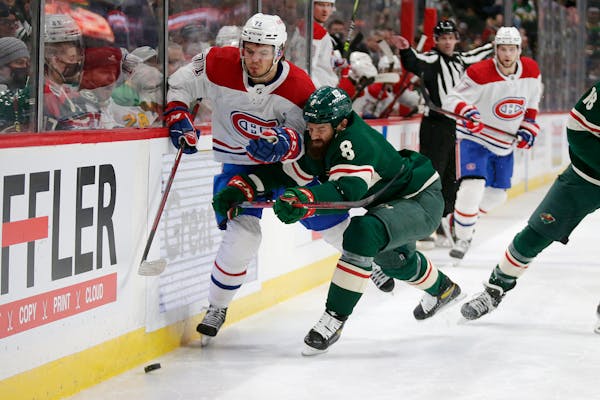The Wild has pulled its goalie 16 times in an effort to catch an opponent on the scoreboard. These attempts have started as early as with 9:20 remaining in the third period, and as late as with 1:39 left.
What's interesting about the last number — 1:39 — is that's about the time in earlier decades that NHL coaches started considering it might be time to hook the goalie to the bench in a desperate attempt to get a tie.
This isn't desperation anymore, at least not in the world of Wild coach Dean Evason. The Wild has scored in nine of those 16 games, a total of 12 goals, earning it 11 points in the standings — four extra-time wins and three points for extra-time losses.
The calmness and puck possession shown by Evason's skaters in the offensive zone with their net empty can blow your mind. Really, it's the hockey version of an acid trip; it's as if Timothy Leary's the coach, not a stern-looking 57-year-old from Flin Flon.
“There's a lot more risk tolerance with the coaches today; it's similar to football coaches passing up the punt to go for it on fourth down.”
Craig Leipold, the Wild owner, is a legitimate nervous wreck during games. On Tuesday, he was asked if the Wild's extraordinary success with the goalie out has allowed him to relax a touch in those situations.
"I'm not sure about that,'' Leipold said. "On Saturday night, we fell behind the Blackhawks with eight minutes left and I was thinking to myself, 'Come on, fellas. Let's not do this again. Let's not put me through pulling the goalie another time.'
"Sure enough, out comes the goalie, and we score a minute later — Kevin Fiala again — to tie it, and then we win in overtime.
"This is a special team in a lot of ways, including those situations. Reminds me of the Blackhawks from six years ago. They would pull the goalie, and out would come [Patrick] Kane and [Jonathan] Toews, and it seemed like they always scored.''
Wes Walz played more than 600 games in the NHL, a very large share of those during the Wild's first eight seasons. The Wild's pulled-goalie performance halfway through the 2021-22 season reminds him of … nothing he's witnessed.
"Nobody has ever seen anything like this,'' Walz said. "I've given it a lot of thought, and I can't come up with a comparison. They have scored two goals three times late in games with the goalie pulled. You could follow an NHL team for 25 years and not see it do that three times, and this Wild team has done it in a half-season.
"This team is so patient in the offensive zone. And they are so good at puck retrieval, there are two- or three-minute stretches the defense can't get off the ice.
"I spent my whole career out there on defense when a goalie was pulled. You've already played almost a full game, and now you're in constant motion trying to stay with the puck, and you're basically exhausted after 30 seconds.
"That's why I can tell you from much experience the odds are much-better for a team allowing a goal in the second 30 seconds than in the first 30 with a goalie pulled.''
Make that two or three minutes, as the Wild has been controlling the puck, and the pulled-goalie scores become slightly more imaginable.
"That, and of course, the biggest thing ... skilled players who can handle the puck,'' Walz said. "You can go down the list, from [Kirill] Kaprizov to the rookie, Matthew Boldy. This is a different level of talent throughout the lineup.''
NHL standings: Conference | Wild Card
Tom Chorske, an NHLer for 11 seasons ending in 2001, also has been trying to figure out this Wild/pulled goalie bonanza.
"There's a lot more risk tolerance with the coaches today; it's similar to football coaches passing up the punt to go for it on fourth down,'' Chorske said.
"My idea is that it's traced to teams spending so much time working on puck possession. You have more 4-on-4 situations; you have 3-on-3 in overtime. Three-on-three … you can't dump it in and chase, and I think that's carried over to the pulled-goalie situations.
"The profile of NHL players has changed drastically toward the skill side. There's no instigating, no hooking, no holding. Those players are mostly gone. Puck possession is what teams want. Roster spots are too valuable to use on players who can't help in that area.''
Which gets us to Evason pulling a goalie early, rather than late, figuring his puck handlers can swarm long enough to score one (or two) before the defenders can get a clear look at the open net.
As of now, the Wild has 12 goals scored compared to six allowed into the open net and, to repeat, 11 added points in the standings.
Reusse: Hoosiers football at last enjoys its moment in the spotlight

Reusse: Bemoan baseball's decline, or watch the right documentary

Reusse: From the best player in franchise history to a details guy, Wild are showing a sturdy crew
Vikings fans from Hawaii eager to watch the team in person Sunday


